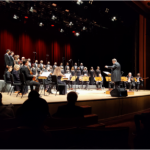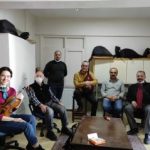
Audrey Wozniak, Harvard Üniversitesi’nde etnomüzikoloji alanında doktora adayı olup, tezini akrabalığın ve devletin söylemsel ve maddi kurguları üzerine yazmaktadır. Hâlen Türkiye ve diasporadaki Klasik Türk Müziği korolarını inceleyerek disiplin kavramının Türk sivil toplumunu nasıl şekillendirdiğini araştırıyor. Akademik çalışmaları ve gazete yazıları Urban People, Applied Linguistics Review, Georgetown Journal of Asian Affairs, China Dialogue, TimeOut Hong Kong, and ABC News’ta yayımlanan Wozniak aynı zamanda başarılı bir kemancı ve Klasik Batı ve Türk müziği icracısıdır. Yayınlarına ve performanslarına www.audreywoz.com adresinden ulaşılabilir.
Research Title: Turkish Classical Music Choirs: Contesting Subjecthood, Community, and Nation
Ms. Wozniak is a PhD candidate in Ethnomusicology at Harvard University who writes about discursive and material constructions of kinship and the state. She is currently researching how the concept of discipline has shaped Turkish civil society through examining Turkish classical music choirs in the country and its diaspora. She has published academic and journalistic writing in Urban People, Applied Linguistics Review, Georgetown Journal of Asian Affairs, China Dialogue, TimeOut Hong Kong, and ABC News. Wozniak is also an accomplished violinist and performer of Western and Turkish classical music. Her publications and performances can be found at www.audreywoz.com.
Fellow’s End of the Academic Year Research Report:
Turkish Classical Music Choirs: Contesting Subjecthood, Community, and Nation
In the 2021–2022 academic year, I was fortunate to have been an ANAMED-BIAA Joint Fellow. The generous support of these two institutions enabled me to conduct archival and ethnographic research on the historical emergence and current manifestations of the koro (choir) in Turkish classical music. The archival documents and recordings I have uncovered in this past year have helped situate this new format of music-making in a musical tradition that claims a history over 1,000 years old in both the Ottoman and Byzantine Empires. Conducting extensive interviews and participant-observation with current participants in both amateur and state-affiliated choirs (Fig. 1) has demonstrated the extent to which these ensembles can reveal contested relationships between the state and civil society in Turkey.

Fig. 1. Performance by the Presidential Classical Turkish Music Choir. (Photo by author)
The tradition referred to as “Turkish classical music” is a legacy of the Turkish nation-building project undertaken since the years preceding the Republic’s inception in 1923; the umbrella term “Turkish classical music” attempts to synthesize and unite a disparate collection of musical traditions hearkening from the Ottoman Empire to the modern day. These musical traditions include instrumental and vocal works of the Ottoman court, music of Sufi orders since the fourteenth century, and late-nineteenth and twentieth century art music that originated in urban nightclubs (gazino). Although group singing has existed in various forms within these traditions for centuries, the choir as an ensemble format within Turkish classical music is a phenomenon that emerged in the early twentieth century in tandem with the formation of the Turkish Republic. Now, in addition to state-affiliated choirs, amateur Turkish classical music choirs are ubiquitous in Turkish urban centers, as well as Turkish diasporic communities around the world. In my project, I am tracing the historical emergence of the choir in Turkish classical music-making, as well as its current manifestations in the context of competing social and political forces in Turkey.
My objective for my research during my Joint Fellowship was to conduct archival research on Turkey’s earliest choirs, as well as conduct interviews with conductors and cultural bureaucrats who have worked with state-sponsored and amateur Turkish classical music choirs. As a visiting scholar at Istanbul Technical University, I was able to access the archives of Turkey’s first state-accredited conservatory of Turkish music, which holds significant written and recorded resources related to musical instruction and education in Turkey. In addition, I continued to expand my network of professional contacts, who helped me find opportunities to observe and participate in rehearsals, concerts, and other Turkish classical musical gatherings (Fig. 2).

Fig. 2. Playing music with my interlocutors is a fundamental component of my ethnographic research. Photo provided by author.
Having moved to Turkey for predissertation research in the fall of 2019, I experienced both the ethnographic benefits and challenges of Covid-19. Being able to attend choir rehearsals over Zoom gave me new routes to engage with participant-observation. As a guest researcher at the conservatory library, I could peruse the archives freely and work closely with the librarian, even though the campus was closed to students and the public due to the pandemic. The closure of many public meeting points and concerts created unlikely opportunities for me to connect and play music with many musicians somewhat secretly socializing in instrument ateliers. However, persevering with fieldwork in the pandemic did come with drawbacks: I spent a significant part of my research period struggling with illness, including a third bout of Covid-19 and a severe strep infection.
Despite these setbacks, this year as a Joint Fellow, I have been able to attend rehearsals and concerts as restrictions have eased. Through seeing public music-making “in action” and having opportunities to discuss the musical profession with musicians now that concerts are permitted, I have been able to better contextualize the knowledge I acquired in the previous year. Participant-observation and interviews this year have helped me refine many of the research questions with which I embarked upon my dissertation project. In particular, I have gained a new appreciation for the crucial and near-inalienable role that social media plays in mediating musician’s relationships to each other and their environment in the Turkish musical scene (among many other artistic professions, such as dance, theater, fashion, and photography). I have observed how social media use has transformed people’s behaviors and concerns; I have also found that social media’s modes of communication engender ambiguities in intention that perpetuate the inequitable power dynamics women must confront in negotiating a professional career in music. The norms of self-promotion and networking in the virtual world collide directly with historically engrained gender dynamics and notions about the relationship between women’s respectability and their music-making. I plan to explore how virtual socialities animate historical discourses that continue to haunt Turkish women’s paths to musical competence and professionalization (particularly performance opportunities), creating a paradox for female musicians seeking to hone their craft in the public eye.
Furthermore, my conversations with musicians, as well as archival research, has illuminated how musicians animate a dichotomy between the categories amatör (amateur) and profesyonel (professional), as well as how historical and present music-making practices complicate these categories. As I have immersed myself in the Turkish classical music scene, particularly in Istanbul, through musical participant-observation, extensive interviews, and archival research, I have been struck by how musicians use amatör and profesyonel to enforce a hierarchy that arbitrates which musicians have enough status to transmit a form of national culture. Historically, embracing amateurism and avoiding music as a primary occupation served as a strategy of status maintenance and reputational preservation; detaching the transactional commercial exchange from musical transmission ensured that one would not be mistaken for a çalgıcı (low-status, itinerant, wedding musician). However, after the formation of the Turkish Republic, the advent of Turkish state radio, as well as the rise of the recording industry, created new systems of patronage that, for the first time, ushered in the concept of music as a full-time occupation, as well as the concept of a “professional” musician (i.e., someone whose entire livelihood was derived from music). Now, musicians employed in state ensembles often position themselves at the top of this hierarchy through asserting their role within the state apparatus that validates their own authority.
In my research, I assert that the state’s role in creating such professional pathways has been and continues to be part of a broader nation-building project, one that seeks to curate and consolidate state control over “national culture,” as well as who is allowed to transmit it. I seek to understand why and how musicians animate an amateur-professional dichotomy through situating the practices of Turkish classical music choirs in the context of broader sociopolitical structures and tensions. In this vein, I hope to bring to the fore modes of engagement that elude singular categorization as either amateur or professional; I also explore how the category of “amateur” invokes and reinscribes gender dynamics that frequently inhibit women’s full participation as musical professionals. Although “professional” musicians often position themselves in contrast to “amateurs” to assert their authority and dismiss other musicians, I aim to demonstrate how amateur spaces can be empowering, celebratory, and therapeutic for their participants, particularly for female musicians. Going forward, I hope to demonstrate how choirs in Turkey and its diaspora can generate alternative readings of amateurism, offering models for creating community, as well as sites of political imagination.
During the period of my fellowship, I have been able to present the results of my work in multiple venues. I delivered a paper entitled “Turkish Classical Music Choirs and the Making of a Musical ‘Profession’” at the British Forum for Ethnomusicology Annual Conference, which I will also be presenting this summer at the 21st Quinquennial IMS Congress in Athens, Greece. I will also present on this research in longer form lectures for ANAMED, as well as the British Institute at Ankara. These ideas I present in these lectures will comprise a significant aspect of my dissertation, “A Discipline for the Nation: Turkish Classical Music Choirs in History and Practice.” In addition to my primary project, I was very excited to make progress on three article projects. In the fall of 2021, the anthropology journal Urban People published my article “Producing and Transgressing the Family: State, Kinship, and China’s Uyghurs.” I submitted my article “The Zildjian Cymbal: Lineages of Blood and Alloy and the Reckoning of Modern Time” for the journal American Music, where it is currently under review, and also presented this work at the Society of Ethnomusicology’s Annual Meeting in the fall. This spring, I have submitted a third article, “Prosodic Priorities and the Making of the Turkish National Anthem,” for the Journal of the American Musicological Society. Finally, I enjoyed giving guest presentations for students at MEF University and Harvard University about the field of ethnomusicology, as well as the joys and challenges of ethnography as a research method.
Following the completion of my ANAMED-BIAA Joint Fellowship, I will continue my research in Turkey through the Fulbright-Hays Doctoral Dissertation Research Abroad program, as well as a fellowship at the Orient-Institut Istanbul. I am very excited for the archival and ethnographic research opportunities the Joint Fellowship has enabled. In the following year, I intend to process the data I have collected as I immerse myself in writing the bulk of my dissertation. I will also engage in dialogical editing with the communities I study and continue collecting data for future projects inspired by the research I conducted in this past year. I cannot overstate the impact ANAMED and the BIAA’s support of my research has made in allowing me to make significant scholarly strides on my dissertation, as well as secondary projects, and am truly grateful to be part of such an inspiring intellectual community.

